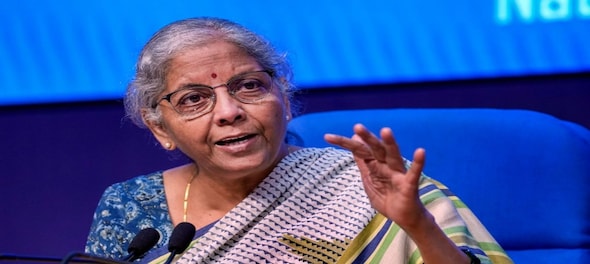
Finance Minister Nirmala Sitharaman raised some concerns facing the global economy, including on effectiveness of multilateral institutions, challenges with energy transition, food security and reducing debt, among other issues, on Day 1 of the three-day Kautilya Economic Conclave 2023.
The conclave, organised by the Institute of Economic Growth (IEG), is taking place in Mumbai from October 20-22 and Reserve Bank of India (RBI) Governor Shaktikanta Das will also be speaking there.
Here are some key takeaways from Sitharaman's speech:
# Effectiveness of multilateral institutions
FM Sitharaman expressed concerns about the inadequacy of major multilateral institutions, including the United Nations, the World Health Organization, the World Trade Organization, the United Nations and the UNSC.
"Interventions by these organisations, other than multilateral development banks, are currently less effective than ideal, especially since they were first instituted. This decline in effectiveness is reshaping strategic blocks across the world, impacting supply chains, and has far-reaching consequences," she said while adding the world has not yet recovered from COVID.
# Climate change and clean energy transition
India doesn't have answers yet on the transition energy, she said, adding that the path from fossil to renewable is complicated. "Till today no one is able to tell us which is that one energy which can be used for transition. Low-income, developing countries cannot afford big money for energy transition," she said.
The government is constrained by limited financial resources, she said, and natural gas is no longer considered a viable solution for the energy transition. This underscores the need for innovative and cost-effective solutions.
# Food security template
India is working on establishing a template to maintain food security, she said. "There should be a regional balance for basic staples for sufficiency and security," she said.
This effort goes beyond India's borders, as the Finance Minister highlighted the importance of regional balance for basic staples to ensure food sufficiency and security, particularly in the context of global uncertainties.
# Regulation of crypto
Cryptocurrency is not something where any one country can succeed, the finance minister noted in her remarks. She added that the matter was taken up with the recently concluded G20 group for consensus on whether crypto should be regulated and if so, how. The G20 is now coming out with a template for the crypto world, she added.
# Debt reduction and fiscal responsibility
The FM said the Indian government is actively working on reducing debt levels, taking inspiration from how other economies manage their debts.
"The government is conscious of the debt burden. Our efforts are very well streamlined and I am sure we will be able to bring it down. Need to be sure that the money spent is well used. Bang for the buck is well in our minds," she said.
# Global terrorism as a primary business risk
Sitharaman also touched upon the pressing concern of global terrorism, acknowledging that it has become a "permanent uncertainty" with a high-cost risk associated with it. This serves as a primary risk for businesses worldwide and economic policies alone are insufficient to address it. Companies need to factor in the impact of terrorism on their operations and strategies, she said.
Winding up her remarks, Sitharaman pointed out that the government is conscious of macroeconomic stability and fiscal management in its decision-making. This comes at a time when India is gearing up for the 2024 Lok Sabha elections and the Budget announcement in February.
(Edited by : Amrita)
First Published: Oct 20, 2023 11:13 AM IST
Check out our in-depth Market Coverage, Business News & get real-time Stock Market Updates on CNBC-TV18. Also, Watch our channels CNBC-TV18, CNBC Awaaz and CNBC Bajar Live on-the-go!


Exclusive | Full text of the PM interview: Modi's agenda for the next 5 years
Apr 29, 2024 10:28 PM
PM Modi says he’s going forward with a positive attitude as a response to personal attacks
Apr 29, 2024 10:08 PM

